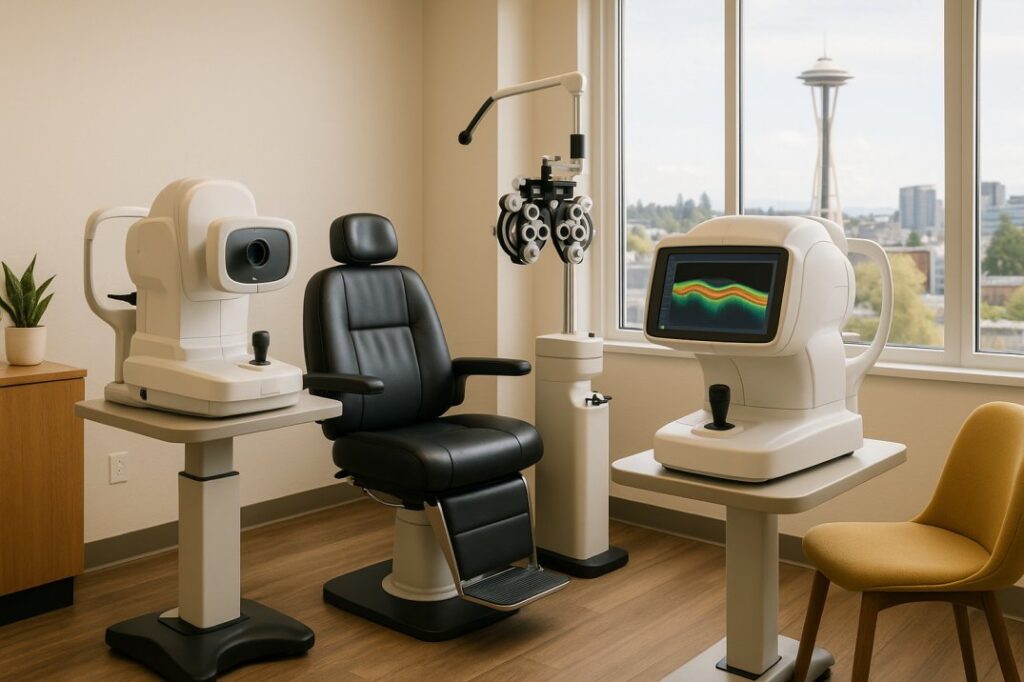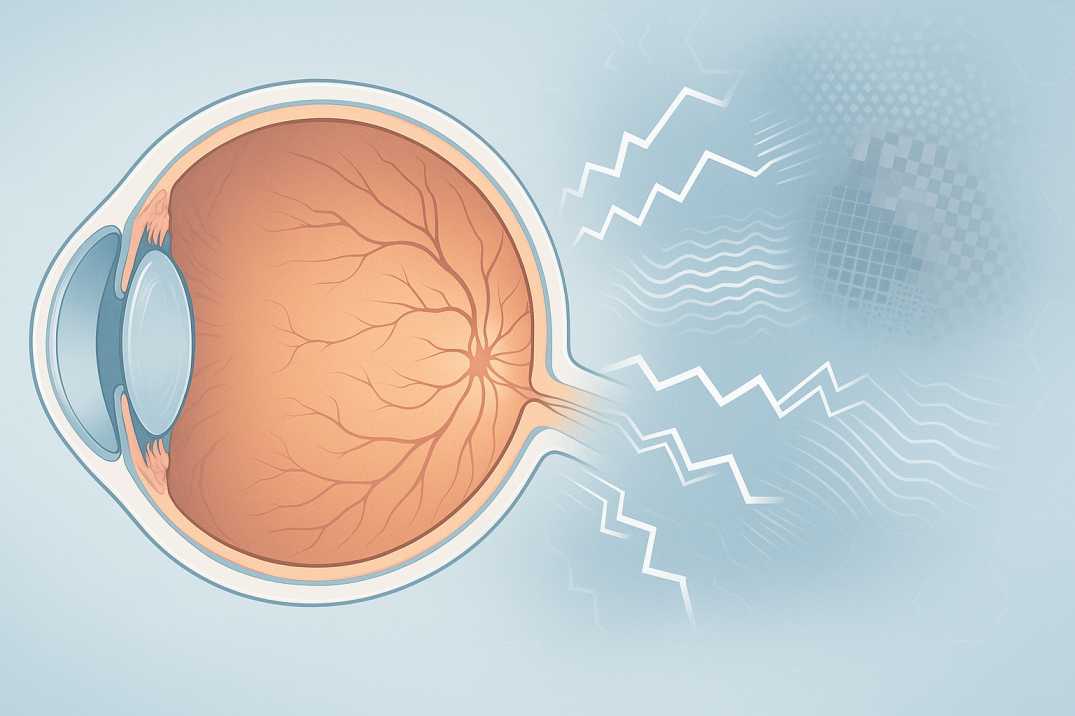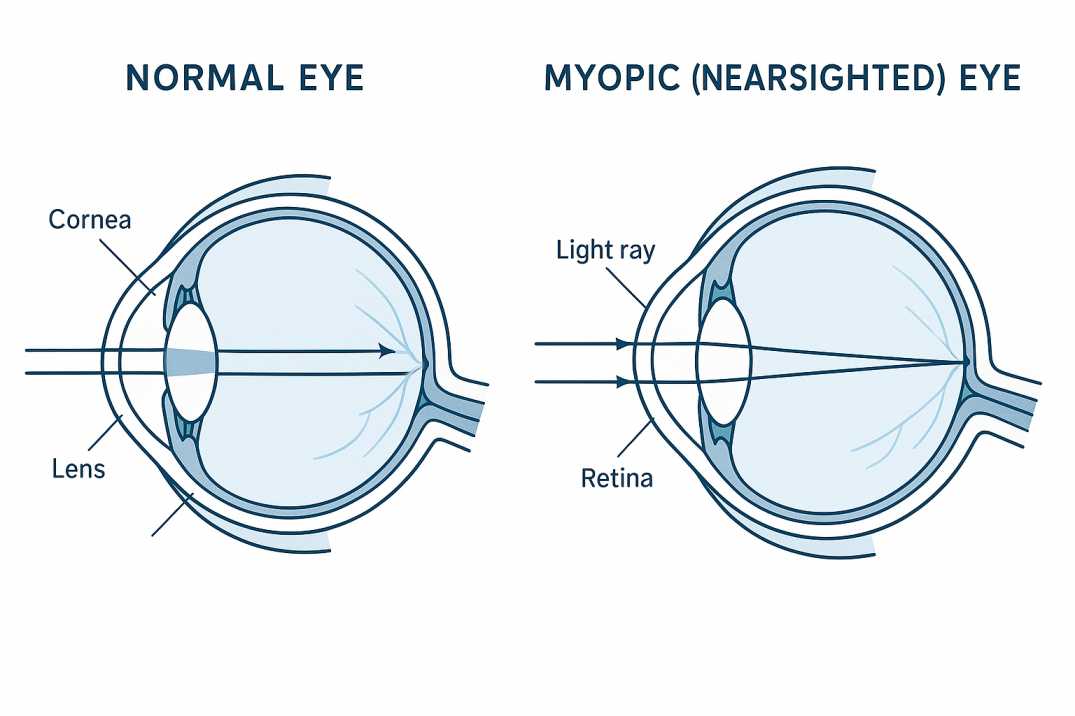Blurry Vision Causes & Treatment | Cannon EyeCare Seattle
Bottom Line Up Front: Blurry vision affects millions of people and can range from simple refractive errors requiring glasses to serious conditions needing immediate medical attention. At Cannon EyeCare in Seattle, our comprehensive eye exams and expert care help identify the root cause of your blurry vision and provide personalized treatment solutions. Whether you’re experiencing sudden vision changes or gradual blurriness, early detection and proper care are essential for maintaining your eye health.
Experiencing blurry vision can be frustrating and concerning, affecting everything from your work productivity to daily activities like reading and driving. Whether your vision becomes fuzzy gradually over time or suddenly without warning, understanding the potential causes and knowing when to seek professional help is crucial for protecting your sight.
At Cannon EyeCare, located in Seattle’s University Village and Pike Place Market areas, we bring Midwestern hospitality to the West Coast while providing comprehensive, expert eye care. Our thorough approach goes beyond basic vision screenings to catch issues others might miss, ensuring you receive the personalized attention your eyes deserve.
What Is Blurry Vision?
Blurry vision, also called blurred vision, occurs when your eyesight lacks sharpness and clarity. Objects may appear fuzzy, out of focus, or distorted, making it difficult to see fine details. You might find yourself squinting, blinking frequently, or rubbing your eyes to try to achieve clearer vision.
Blurry vision can affect one or both eyes and may occur at different distances – some people have trouble seeing distant objects clearly (nearsightedness), while others struggle with close-up tasks like reading (farsightedness). The blurriness can develop slowly over months or years, or it can appear suddenly, which often indicates a more serious underlying condition.
Common Symptoms Accompanying Blurry Vision
While blurry vision is the primary symptom, it often occurs alongside other signs that can help identify the underlying cause:
- Eye strain and fatigue
- Dry, irritated, or watery eyes
- Headaches, particularly around the eyes
- Difficulty focusing when switching between near and far objects
- Sensitivity to light or glare
- Seeing halos around lights
- Double vision
- Eye pain or discomfort
- Redness or inflammation
Leading Causes of Blurry Vision
Understanding what causes blurry vision helps determine the appropriate treatment and urgency of care needed. The causes generally fall into several categories, from common refractive errors to serious medical emergencies.
Refractive Errors: The Most Common Culprit
Refractive errors account for the majority of blurry vision cases and occur when the eye cannot properly focus light on the retina. These conditions include:
Myopia (Nearsightedness): Distant objects appear blurry while close objects remain clear. This condition has become increasingly common, particularly among younger people and those who spend significant time on digital devices.
Hyperopia (Farsightedness): Close objects appear blurry while distant vision may remain clearer. Many people with mild farsightedness may not notice symptoms until they reach their 40s.
Astigmatism: An irregularly shaped cornea or lens causes both near and distant objects to appear blurry or distorted. Astigmatism often occurs alongside myopia or hyperopia.
Presbyopia: Age-related changes in the eye’s lens make it difficult to focus on close objects. This natural aging process typically begins in the mid-40s and affects everyone eventually.
Digital Eye Strain: The Modern Epidemic
With increased screen time becoming the norm, especially following the COVID-19 pandemic, digital eye strain has emerged as a significant cause of blurry vision. Also known as Computer Vision Syndrome, this condition results from prolonged use of computers, smartphones, tablets, and other digital devices.
During the pandemic, research showed a dramatic increase in digital eye strain cases. A comprehensive 2024 meta-analysis of 103 studies with 66,577 participants found that the pooled prevalence of computer vision syndrome reached approximately 66%, meaning two out of every three knowledge workers experience some degree of digital eye strain. Among children specifically, prevalence rates jumped to 50-60% during online learning periods. The constant focusing and refocusing required to view pixelated screens, combined with reduced blink rates, leads to eye fatigue and temporary blurriness.
Dry Eye Syndrome
Dry eye occurs when your eyes don’t produce enough tears or when tears evaporate too quickly. This condition can cause blurry vision that often improves temporarily after blinking. Dry eye has become increasingly common due to factors including increased screen time, environmental conditions, certain medications, and age-related changes.
Age-Related Eye Conditions
Several eye conditions become more common with age and can cause progressive blurry vision:
Cataracts: Clouding of the eye’s natural lens causes gradual vision loss, increased sensitivity to glare, and difficulty seeing at night. Cataracts are extremely common in older adults and can be successfully treated with surgery.
Age-Related Macular Degeneration (AMD): This condition affects central vision, making it difficult to see fine details. AMD is a leading cause of vision loss in people over 50 and requires prompt treatment to prevent progression.
Glaucoma: Often called the “silent thief of sight,” glaucoma gradually damages the optic nerve, typically starting with peripheral vision loss before affecting central vision.
Diabetes-Related Vision Problems
Diabetic retinopathy occurs when high blood sugar levels damage the blood vessels in the retina. This serious complication can cause blurry vision, dark spots, and eventually blindness if left untreated. People with diabetes need regular comprehensive eye exams to monitor for early signs of retinal damage.
Medical Emergencies Causing Sudden Blurry Vision
Certain conditions require immediate medical attention:
Stroke: Sudden blurry vision, especially when accompanied by other neurological symptoms, may indicate a stroke requiring emergency treatment.
Retinal Detachment: When the retina separates from the back of the eye, it can cause sudden vision loss, flashing lights, and a “curtain” effect across the visual field.
Acute Angle-Closure Glaucoma: This rare but serious condition causes a rapid increase in eye pressure, leading to severe eye pain, nausea, and sudden vision loss.
Medications and Health Conditions
Various medications can cause blurry vision as a side effect, including antihistamines, antidepressants, and blood pressure medications. Additionally, conditions such as high blood pressure, autoimmune diseases, and migraines can affect vision. At Cannon EyeCare, we carefully review all medications and health conditions that might contribute to your blurry vision symptoms.
When to Seek Professional Eye Care
While some causes of blurry vision are minor and temporary, others require prompt professional attention. Understanding when to schedule an appointment versus when to seek emergency care can help protect your vision.
Schedule an Eye Exam Soon If You Experience:
- Gradual worsening of vision over weeks or months
- Difficulty seeing at night or in low light
- Frequent squinting or eye strain
- Headaches that seem related to vision
- Problems with glare or halos around lights
- Difficulty focusing when switching between near and far objects
Seek Immediate Medical Attention For:
- Sudden onset of blurry vision
- Complete or partial vision loss
- Severe eye pain
- Sudden appearance of flashing lights or floaters
- Curtain-like shadow across your visual field
- Blurry vision accompanied by symptoms of stroke (confusion, difficulty speaking, weakness)
At Cannon EyeCare, we understand that eye emergencies can be frightening. Our team is trained to handle urgent eye conditions and will work quickly to assess your situation and provide appropriate care or referrals.
Comprehensive Diagnosis: What to Expect
When you visit Cannon EyeCare for blurry vision concerns, you can expect a thorough, unhurried examination that goes far beyond a basic vision screening. Our comprehensive approach reflects our commitment to catching issues that others might miss.
Medical History and Symptom Assessment
Dr. Mark Cannon and Dr. Miranda Cannon begin each examination by discussing your symptoms in detail, including when the blurriness started, whether it affects one or both eyes, and any accompanying symptoms you’ve noticed. We’ll also review your medical history, current medications, and family history of eye diseases.
Visual Acuity Testing
We measure how well you can see at various distances using standardized eye charts. This testing helps determine if you need corrective lenses and provides baseline measurements for future comparisons.
Refractive Error Assessment
Using advanced diagnostic equipment, we precisely measure how light focuses in your eyes to determine if refractive errors are causing your blurry vision. This information helps us prescribe the most accurate corrective lenses.
Comprehensive Eye Health Evaluation
Our examination includes a detailed assessment of all eye structures:
- Pupil Response Testing: Evaluates how your pupils react to light changes
- Eye Movement Assessment: Checks how well your eyes work together
- Intraocular Pressure Measurement: Screens for glaucoma using the latest technology
- Dilated Retinal Examination: Allows detailed viewing of the retina, optic nerve, and blood vessels
- Digital Retinal Photography: Creates detailed images for monitoring and comparison over time
Advanced Diagnostic Technology
Cannon EyeCare utilizes state-of-the-art equipment to provide the most accurate diagnoses:
- Optical Coherence Tomography (OCT): Provides detailed cross-sectional images of the retina
- Visual Field Testing: Evaluates peripheral vision and screens for glaucoma
- Corneal Topography: Maps the surface of the cornea for contact lens fitting and disease detection
Treatment Options for Blurry Vision
The treatment for blurry vision depends entirely on the underlying cause. At Cannon EyeCare, we develop personalized treatment plans that address your specific needs and lifestyle requirements.
Corrective Lenses
For refractive errors, corrective lenses remain the most common and effective treatment:
Eyeglasses: Modern lens technology offers numerous options, including progressive lenses for presbyopia, anti-reflective coatings to reduce glare, and blue light filtering for digital device users.
Contact Lenses: We fit a wide variety of contact lenses, including daily disposables, specialty lenses for astigmatism, and multifocal lenses for presbyopia.
Dry Eye Treatment
Our comprehensive dry eye management includes:
- Artificial tears and lubricating drops
- Prescription medications to increase tear production
- Punctal plugs to reduce tear drainage
- Lifestyle modifications and environmental changes
- Advanced treatments for severe cases
Digital Eye Strain Management
For patients experiencing computer vision syndrome, we recommend:
- Specialized computer glasses with anti-reflective coatings
- Blue light filtering lenses
- Proper workstation ergonomics
- The 20-20-20 rule: Every 20 minutes, look at something 20 feet away for 20 seconds.s
- Regular breaks from digital devices
Medical Management
For conditions such as diabetes-related eye disease or glaucoma, we provide:
- Monitoring and co-management with your primary care physician
- Prescription eye drops for glaucoma
- Referrals to retinal specialists when needed
- Regular follow-up examinations to monitor progression
Surgical Referrals
When surgical intervention is necessary, we work with trusted specialists in the Seattle area for procedures such as:
- Cataract surgery
- Retinal treatments
- Glaucoma surgery
- Refractive surgery consultations
Prevention and Eye Health Maintenance
Protecting your vision starts with good daily habits and regular professional care. Here are evidence-based strategies to maintain healthy eyes and prevent blurry vision:
Digital Device Best Practices
With increased screen time being unavoidable for most people, proper digital hygiene is essential:
- Position screens at arm’s length and slightly below eye level
- Ensure adequate lighting to reduce contrast between the screen and surroundings
- Increase text size rather than leaning closer to the screen
- Take regular breaks and practice the 20-20-20 rule
- Keep screens clean to reduce eye strain
- Consider computer glasses with an anti-reflective coating
Environmental Factors
Your surroundings significantly impact eye comfort:
- Use humidifiers in dry environments
- Avoid direct airflow from fans or air conditioning
- Wear wraparound sunglasses with UV protection outdoors
- Ensure adequate lighting for reading and close work
Nutrition for Eye Health
Certain nutrients support eye health and may help prevent age-related vision problems:
- Omega-3 fatty acids: Found in fish, flaxseed, and walnuts, these support tear production and retinal health
- Lutein and zeaxanthin: Present in leafy greens, these antioxidants protect the macula
- Vitamins C and E: Support overall eye health and may reduce cataract risk
- Zinc: Important for retinal function and night vision
Lifestyle Modifications
Simple lifestyle changes can significantly impact eye health:
- Don’t smoke – smoking increases the risk of cataracts, macular degeneration, and dry eye
- Manage chronic conditions like diabetes and high blood pressure
- Stay hydrated to support tear production
- Get adequate sleep to allow your eyes to rest and recover
- Exercise regularly to improve blood circulation to the eyes
Recent Scientific Research on Blurry Vision
Recent research has provided valuable insights into the causes and prevention of blurry vision, particularly in our digital age.
COVID-19 Pandemic Impact Study (2024)
A comprehensive systematic review and meta-analysis published in BMC Public Health examined computer vision syndrome prevalence during the COVID-19 pandemic. Analyzing 103 cross-sectional studies with 66,577 participants from 20 countries, researchers found that the pooled prevalence of computer vision syndrome reached approximately 66%. This means that two out of every three knowledge workers experience some degree of digital eye strain, representing a significant increase from pre-pandemic levels.
Pediatric Digital Eye Strain Research (2021)
The DESK (Digital Eye Strain among Kids) study, published in the Indian Journal of Ophthalmology, examined digital eye strain in children during online learning. The research found that 50.23% of children experienced digital eye strain, with symptoms including itching, headaches, and blurry vision. The study identified male gender, smartphone use, and device usage exceeding one hour daily as significant risk factors, emphasizing the need for parental education about healthy screen habits.
Saudi Population Eye Strain Study (2022)
Research published in International Ophthalmology examined eye strain in a Saudi population during the COVID-19 lockdown. The study of 2,009 individuals found significant correlations between increased digital device usage and eye strain symptoms, with longer duration of use directly associated with symptom severity. This research supported the importance of educating the general population about measures to mitigate eye strain from digital devices.
Why Choose Cannon EyeCare for Your Blurry Vision Concerns
At Cannon EyeCare, we understand that blurry vision can significantly impact your quality of life. Our approach combines advanced technology with the personal touch and thorough care that sets us apart from chain providers.
Our Unique Approach
Midwestern Hospitality Meets Expert Care: Dr. Mark and Dr. Miranda Cannon bring authentic Midwestern values to Seattle, ensuring every patient receives unhurried, personalized attention.
Comprehensive Examinations: We take the time necessary to thoroughly evaluate your eye health, using advanced diagnostic equipment to catch issues that might be missed in rushed appointments.
Specialized Dry Eye Care: Our expertise in dry eye treatment helps patients find relief from this common cause of blurry vision.
Convenient Seattle Locations
We’re proud to serve the Seattle community from our two convenient locations:
- University Village: Easily accessible with ample parking for our busy Seattle professionals
- Pike Place Market: Serving downtown Seattle and surrounding neighborhoods
Technology and Expertise
Our practice features state-of-the-art diagnostic equipment, including retinal photography and advanced pressure measurement tools, ensuring you receive the most accurate diagnosis and appropriate treatment for your blurry vision concerns.
Insurance and Accessibility
We accept most major vision insurance plans, including Premera, Regence, Kaiser PPO, and Medicare, making quality eye care accessible to our diverse patient base.
Taking Action: Your Next Steps
If you’re experiencing blurry vision, don’t wait for symptoms to worsen. Early detection and treatment of eye conditions can prevent permanent vision loss and improve your quality of life. Cannon EyeCare specializes in comprehensive blurry vision diagnosis and treatment.
What to Bring to Your Appointment
- Current eyeglasses or contact lenses
- List of current medications
- Insurance information
- Any previous eye exam records
- Questions or concerns about your vision
Preparing for Your Visit
- Avoid wearing contact lenses for several hours before your appointment if possible.
- Arrange transportation if you expect to be dilated
- Write down any symptoms or changes you’ve noticed in your vision
Conclusion: Clear Vision, Better Life
Blurry vision doesn’t have to diminish your quality of life. Whether caused by simple refractive errors, digital eye strain, or more complex conditions, effective treatments are available. The key is receiving prompt, comprehensive care from experienced professionals who understand both the medical and personal impact of vision problems.
At Cannon EyeCare, we’re committed to being your long-term partner in maintaining healthy vision. Our thorough approach, combined with genuine care and attention, ensures you receive the personalized treatment you deserve. From routine vision correction to complex eye health management, we’re here to help you see clearly and comfortably for years to come.
Don’t let blurry vision hold you back from enjoying life’s precious moments. Contact Cannon EyeCare today and experience the difference that comprehensive, compassionate eye care can make. Your vision is irreplaceable – let us help you protect it. Cannon EyeCare remains Seattle’s trusted choice for expert blurry vision diagnosis and treatment.
FAQs
-
Sudden blurry vision can signal a medical emergency like a stroke, retinal detachment, or high blood pressure. Seek immediate medical attention if it appears quickly or with other symptoms




